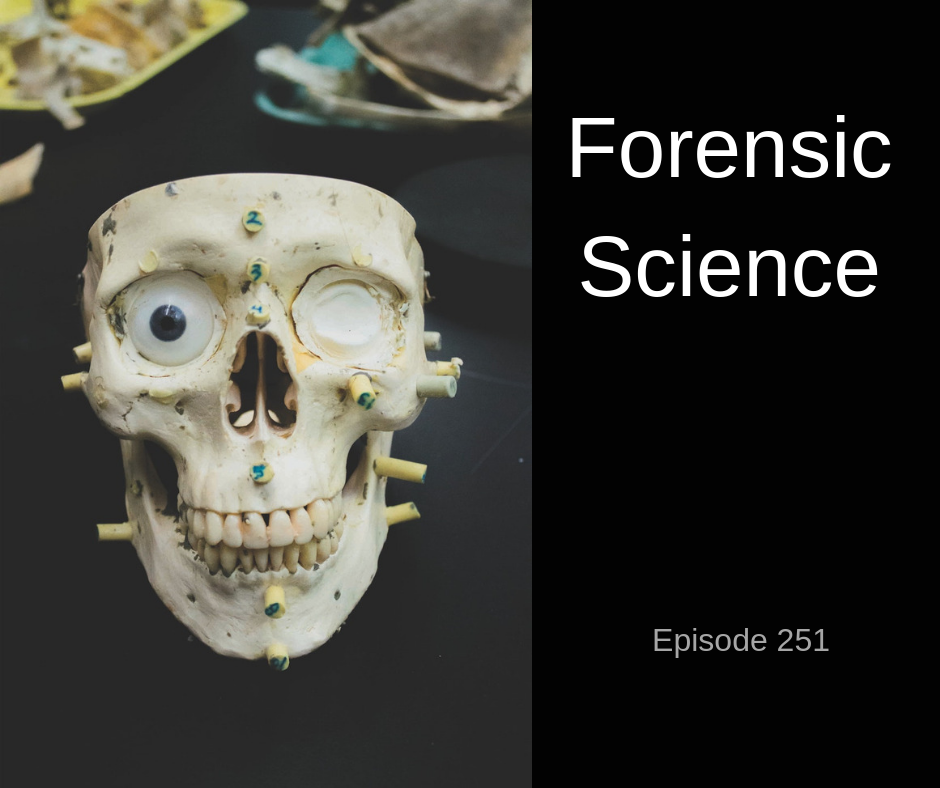
There are many ways to kill someone. You could strangle them, shoot them, stab them, poison them or drown them. Today we’re speaking about forensic science and helping you with some murder vocabulary so that you can understand it better.
Hello to new listener Francisco Peralta from Nicaragua who is working on his fluency and suggests using Google’s voice recognition tool when sending texts or emails.
Episode on Disfluencies: https://inglespodcast.com/172
Email from Ania Daniel who’s originally from Mexico and now living in Chiswick, London. She’s probably listening to this while walking her baby and dog around Chiswick!
She has successfully used the meetup.com website and managed to get a band 7 in the IELTS test. Congratulations!
Ania is doing a Master’s in forensic science and asked if we can speak a bit about it. She wrote:
‘I would like to suggest a podcast about forensic science, criminal forensics, types of evidence, crime scene, toxicology, alibi, DNA analysis, laboratory and stuff like that … it would help me a lot and I think it would be interesting.’
Forensic Science – The scientific procedures used to solve crimes
Crime scene
Pathologist – doctor who examines dead bodies to find out the cause of death
Coroner – person who identifies dead bodies and cause of death, sometimes a trained forensic pathologist, depending on the country.
Autopsy or Post-mortem (examination) – an examination of a dead body to find out the cause of death
Physical evidence – fingerprints, footprints, hairs etc
DNA (Deoxyribonucleic acid) – a substance that carries genetic information
toxicology – the branch of science concerned with the nature, effects, and detection of poisons.
ballistics is the study of motion, dynamics, angular movement, and effects of projectile units (bullets, missiles, and bombs).
To commit a crime / a murder / suicide
To kill / murder – a killer / a murderer
To shoot (with a gun) – a gunman/woman
To stab – apuñalar
To strangle / strangler – to kill by choking
To suffocate – asfixiar
To drown – ahogar(se) eg. The killer drowned the victim. / The man drowned.
To poison / a poisoner – envenenar
To rape – violar /a rapist
TOD – Time Of Death
Alibi – coartada
Recommended TV series
Bones
CSI
Silent Witness (Testigo Mudo)
The Mentalist
1000 Ways to Die
Discussion
Have you ever had your fingerprints taken?
What’s the most effective way to kill someone? – the perfect murder?
In your opinion, what would be the most horrible way to die?
…and now it’s your turn to practise your English.
Send us a voice message. https://www.speakpipe.com/inglespodcast
Send us an email with a comment or question to [email protected] or [email protected].
Visit our online store:
https://store.mansioningles.net/
Thank you to all our wonderful Patrons who are supporting the podcast.
Special thanks to Bruno our Gold Sponsor who offers walking tours of Copenhagen – in English and Spanish – https://www.copenhagenwalkingtour.com/
Also, Favela walking tour in Rio, led by local guides only. It’s safe and it helps the community to improve their daily needs. Go to Bruno’s websites to find out more information: http://www.favelawalkingtour.com.br/
Join our Patreon program for $1 per month and you get instant access to recent transcriptions that have been lovingly transcribed by Angélica Bello. https://www.patreon.com/inglespodcast
Welcome to our new Patreon supporters who have joined us this month:
Fernando Antônio de Paula Andrade
Santiago Diaz de Rivera
Alberto B.O.
Alejandra Coni
Víctor Vaquero
Luis sanz ruiz
Rónald Jesús Espinoza Mora
Andrés Herrera
Alirio Antonio Moreno Medina
Eduardo Hilario
Jose Aristizabal
Armando
On next week’s episode: International Business
The music in this podcast is by Pitx. The track is called ‘See You Later’
Photo by Hannah Gibbs on Unsplash
Our Wonderful Podcast Patreons are:
Adriana Rojas Suarez
Adolfo Dias Sanchez
Agus Paolucci
Ana
Ana Fernandez Monterrubio
Ana Ibarra
Antonio diaz
Arminda
Beatriz Garlaschi
Carlos Cano Domingo
Carlos Sanches
Carmen Martinez
Chus Martinez
Copenhagen Walking Tour
Eloy
Elvira Cortes
Eva Maria Elizalde Martinez
Fernando Ruiz
Fernando Sandoval
Francisco Javier Alejandre Sebastian
Gaby Rojas
Ignacio Espona
Igor Garmendia
Isabel Armada
Ivy Envy Podcast
Javier Correa Sambade
Javier Pablos Rodriguez
Jorge Torres
Jose Luis
Jose Luis Arregui
Jose Luis Hernandez
Jose Manuel Pelaez Invernon
Jose Maria Hernandez Hernandez
Jose Manuel Romero Garcia
Jose Antonio Munoz
Jose Antonio Ramoy Ramirez
Juan Carlos Rodado
Juan Leyva Galera
Juan Pablo Chamorro Villoria
Karo Torres
Kieran
Leandro Henrique Sena Diniz
Luis Jimenez
Luis Lobo Martinez
Maite Palacin Perez
Mamen
Manuel Tarazona
Mar Carmona
Mara Nieto
Mariel Riedemann
Marina Ortiz Pena
Mercedes Dominguez
Miguel
Miren Ful
Nestor G M
Oliver Burgos
Patxi Ibanez
Pilar Martinez Andres
Rafael Castro Guzman
Rogelio Menendez
Sara Jarabo
Txema Santa Cruz



I always listen your postcast, I am from Brazil.
Thanks for listening, Leone. Best wishes from Valencia, Spain!
Oh! I really have to say thank you. I’m a forensic anthropologist from Colombia, but I’ve never studied English, all what I know is because I have to read about my career, so I did not know how to pronounce forensic terms (I have to say they sound quite different from what I thought). Thanks again.
Isla
You’re welcome, Isla. You have a very interesting job. Maybe soon you could send us a voice message and practise speaking a little. We would love to hear from you: https://www.speakpipe.com/inglespodcast